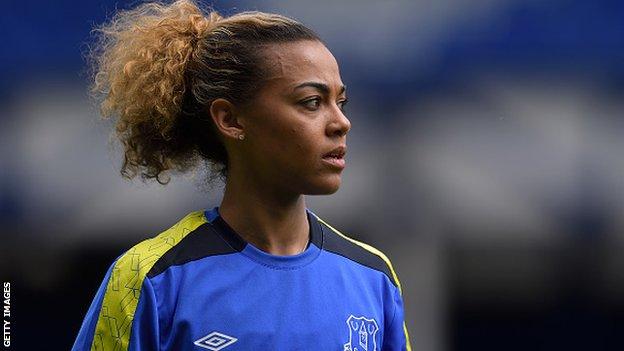PFA launches plan to address 'absence of visible diverse role models' in women's football
Last updated on .From the section Women's Football

The best female footballers in Europe are about to compete in Euro 2022, but the "absence of visible role models from ethnically diverse backgrounds" in England's team for their home tournament "has never been more apparent".
That's the verdict of the Professional Footballers' Association as it launches an initiative to address the lack of ethnic diversity in women's football.
The 'See It Achieve It' campaign will be led by former Brighton defender Fern Whelan, who joined the PFA in 2021 as the organisation's first women's football equality, diversity and inclusion executive.
"I really wanted a platform where the players from the Women's Super League from diverse backgrounds could just be celebrated, and to share their inspiring stories," Whelan tells BBC Sport.
"We don't want any young girls to feel the game isn't for them.
"The overall aim of the campaign is to inspire the next generation of young players coming through so they can see players in those positions and feel like it's a real target they can achieve."
- Everything you need to know about the Uefa Women's Euro 2022
- Who are the players to watch at Euro 2022?
There are only three non-white members of England's 23-woman squad for this month's Euros and the PFA believes that only 29 out of 300 footballers playing in the WSL are from black, Asian and minority ethnic backgrounds - approximately 10%.
That is in contrast to the men's Premier League where it is estimated that just under 45% of players are non-white. In the England men's 2018 World Cup squad, there were 13 players of colour - celebrated as "representing modern, multicultural England".
About 13% of the UK population are from ethnic minority backgrounds.
In 2021, Baroness Campbell, the Football Association's director of women's football, told BBC Sport "right now, to be honest, it's not inclusive enough. And it's not diverse enough, and we know it."
The FA is addressing issues such as a high drop-off rate among teenagers and accessibility to academies outside cities, with coaching schemes, scholarships and talent identification.
The See It Achieve It initiative aims to become a network for current WSL players from black, Asian and minority ethnic backgrounds and will include peer-mentoring workshops and events led by current and former players - which Whelan says will be "powerful to the next players coming through".
Whelan adds: "For me, a real moment I remember was when I was playing as a youngster and [former England and Arsenal forward] Rachel Yankey came to where we were training and that was a real moment for me to say, 'oh there is someone who looks like me who I can aspire to be like'.
"We want these players to feel like part of a family rather than just individuals on this journey alone."
High-profile players such as Anita Asante, Demi Stokes, Nikita Parris and Jess Carter will be involved in the scheme.
Chelsea and England defender Carter says: "We need to make sure there are equal opportunities around the country - in inner-cities and rural areas.
"Money aside, ethnicity aside and background aside, there are amazing footballers everywhere in this country and it's just about giving people a chance to prove that.
"I didn't really have any role models when I was younger, let alone black females. Hopefully, I can be that for those younger boys and girls of colour who want to play," she said.
Manchester City and England defender Stokes says, growing up, she looked up to Yankey as well as Britain's Olympic heptathlon champion Jessica Ennis-Hill, who is also mixed-heritage like Stokes.
"I think kids need someone they can look at and think, 'actually I'm quite similar or my upbringing was the same as yours and you've done well,'" she says.
"As long as you show and teach kids, they will come with you and be inspired. It's so important that we're moving in the right direction, but we still need to keep paying attention to it and we have a duty in these positions."
Alongside the campaign, the PFA is introducing a three-year strategy to increase ethnic diversity within the entire women's game.



















